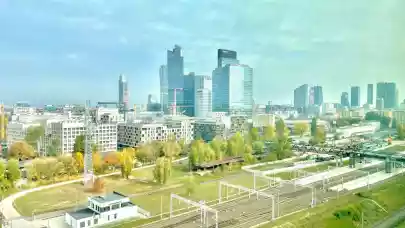
In 2022, the value of transactions on the Polish commercial real estate market amounted to approximately € 5.8 billion, which showed that after the difficult years of the pandemic and the outbreak of conflict in the East, Poland turned out to be a stable market with a large group of investors interested in investing capital in our country and a wide range of attractive investment products. However, in the first half of 2023, we witnessed the previously expected investment slowdown. After six months of 2023, the total investment volume amounted to only around €800 million, which means a decrease of 70 per cent compared to the same period a year earlier, says Bartłomiej Zagrodnik, CEO of Walter Herz advisory agency.
Small transaction volumes, investors mainly from the CEE region
Investors' moods are affected by high project financing costs and uncertain prospects related to changes in the global economy. The decline in investment activity in Poland is also caused by rising interest rates in Europe and an increase in the yield on treasury bonds. Nevertheless, talks regarding larger acquisitions are underway. If they are closed, it will significantly improve the results of the investment transaction market in Poland in the second half of the year.
The market is now dominated by smaller transactions; portfolio investments and large individual transactions are scarce. Most of the capital invested in the Polish commercial real estate market this year came from the countries of Central and Eastern Europe and the Baltic States. Global players have paused their activities and are watching the market.
The limited number of transactions concluded this year is mainly due to the misalignment of price expectations of buyers and sellers, although the discrepancies are smaller than last year. Investors are looking for opportunities, they submit offers below market prices. Property owners, however, do not succumb to pressure and are waiting for more attractive offers.
There is a high activity of investors looking for opportunities to build the value of their real estate and achieve above-average returns, as well as expand their land portfolio in the long term. Investors are also entering joint ventures on a larger scale and looking for merger and acquisition opportunities.
Next year, if interest rates stabilize and financing of investments becomes cheaper, the chance of returning to higher transaction volumes will increase. However, a reversal of the economic trend in the commercial real estate market should not be expected earlier than the beginning of next year.
Warehouses with the largest share in transactions
The warehouse real estate sector is responsible for more than half of the value of investment transactions registered in Poland in the first half of this year. The transaction volume amounted to over €430 million, a third less compared to the previous year. There were no portfolio transactions and large-volume acquisitions, which were the domain of previous years. We can observe a lot of private equity activity in the warehouse market.
Campus 39 complex, among others, was sold in Wrocław. The transactions that should also be mentioned included the purchase of City Logistics Wrocław II by the Czech company Trigea, the acquisition of KGL warehouse by LeadCrest Capital Partners and the transaction concluded between LCN Capital Partners and Panattoni regarding the project in Uniejów. Panattoni has delivered most of the assets that have been acquired on the logistics and industrial market in recent months.
Prices in this segment were optimized to market expectations the fastest. Investors were also encouraged to close transactions by the increase in rents, which was the fastest in this sector.
The office market is on the defensive
In the first half of 2023, the office market saw transactions worth only about €190 million. All purchased properties are located in Warsaw. The structure of purchases was dominated by "core+" and opportunistic assets, which give a chance to rebuild, change functions or generate greater potential.
The largest transactions included the purchase of the Wola Retro building by Adventum International from Develia, the sale of the second stage of the Moje Miejsce project by Echo Investment to Czech Trigea, and the purchase of several office buildings in Wiśniowy Business Park by Indotek.
The largest decrease in the number of new investments is visible in the office sector, which results from the high costs of construction and finishing, as well as the general uncertainty of investors resulting from the micro and macroeconomic situation and global politics.
A large increase in utility costs and climatic requirements increases the pressure to reduce consumption. Both tenants and investors prefer properties with environmental certificates, using technologies to monitor and manage utility consumption. Such real estate is also favoured more by banks.
Piotr Szymoński, Director at Walter Herz: "In the first half of this year, the area of commercial facilities in the Polish investment market, saw the lowest result in over two decades. One of the largest transactions was the sale of the Atrium Molo shopping centre in Szczecin by G City and the purchase of Matarnia retail park in Gdańsk by the French company Frey. The reason for the low activity of investors in the retail sector is the difference in the perception of the capitalization of retail projects. There is a discrepancy between sellers and buyers in the expected rate of return of about 1 per cent".
Investment opportunities wanted
Buyers are looking for investment opportunities, and sellers are holding back their decisions because from their perspective the prices offered are far from satisfactory. However, just like in other sectors, the retail market strives for stabilization in asset valuations, which is why we can expect more investment activity in the upcoming months.
Investors are increasingly ready to engage in projects at an earlier stage of implementation in order to increase the return on investment even at a greater risk. We are seeing an increasing involvement of private investors in the retail market. The large appeal of retail parks and local convenience stores to customers and tenants means that it is currently, next to logistics, the most intensely developing sector in Poland.
Investments in retail parks are encouraged by the lower entry threshold for this type of project. Their construction is also less time-consuming and easier to maintain than in the case of larger complexes. The group of tenants interested in renting them is growing, because they offer lower rents and service charges compared to traditional shopping centres.
Investors are still actively looking for land for new retail projects, preferably on the outskirts of the largest cities, as well as in towns as small as 10 thousand residents, who lack such facilities. When it comes to land, there’s a visible trend of preparing portfolios for projects scheduled to be implemented in 18-24 months.
Apartments in greater demand
It should be noted that in the second quarter of the year, the Polish housing market gained momentum. Residential developers in the six largest cities sold over 15 thousand apartments, an increase of over 50 per cent compared to the previous year and 35 per cent more than in the first quarter of the year. The housing market was warmed up by the government program Bezpieczny Kredyt 2 proc. offering cheap mortgages, which entered into force at the beginning of July. On the other hand, an increase in demand will be met with a lower supply of new apartments. The housing offer is shrinking because developers have not returned to their former activity due to the high costs of implementing new projects.
At the same time, the resources of the Polish PRS market are regularly increasing. Flats from the pool of institutional rental are rented almost in full. The high demand for rental is generated, among others, by citizens of Ukraine and people who, at the current level of interest rates, have no credit capacity and cannot afford to buy real estate.



